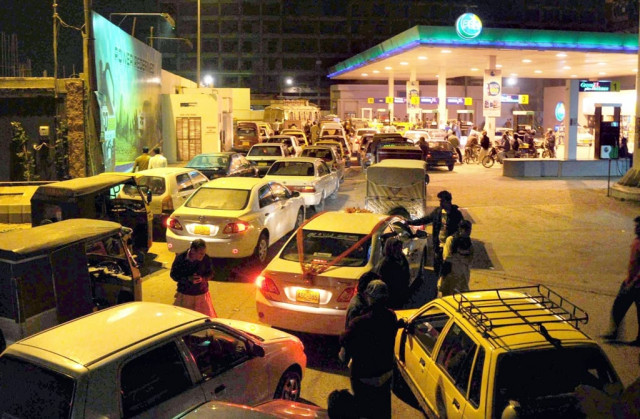CNG stations shutter amid strike calls
Association announces indefinite strike, alleges the shortage is artificial, deliberate.

Resentment against the worsening gas shortage and a simultaneous hike in gas price boiled over on Sunday, with various associations calling for strikes and protests in Punjab and Khyber-Pakhtunkhwa.
The Compressed Natural Gas (CNG) industry meanwhile alleged that gas shortage is artificial and deliberate, designed to allow for imports of more expensive alternatives – LPG and LNG – and favour business tycoons involved.
Strikes, protests
The CNG association is on strike that will continue indefinitely until the government withdraws the gas price hike, said Chairman All-Pakistan CNG Association (APCNGA) Ghyias Paracha while addressing a press conference.
As many as 2,250 CNG stations in Punjab and 7 out of 8 CNG stations in Balochistan have been shuttered, he said.
Paracha also demanded the withdrawal of ban on use of CNG in commercial vehicles.
His strike call was echoed by Khyber-Pakhtunkhwa CNG association president Pervez Khattak who announced that over 600 CNG stations throughout the province will be shut for an indefinite period starting Monday.
The strike on Sunday, however, was reportedly partially observed in Lahore, with more than half of city’s CNG stations open for business.
Meanwhile, president transporters’ association Raja Changez Khan also announced a strike in Islamabad and Rawalpindi on Monday (today).
‘Deliberate’ crisis
Paracha also accused the Sui Northern Gas Pipelines Limited (SNGPL) of ‘willfully aggravating the gas crisis’.
The utility requires 2,500 million cubic feet per day (mmcfd) of gas ‘packed’ in pipelines to keep the system functional. The entity’s documents, however, show that 2,830 mmcfd of gas on December 30, 2011, Paracha said.
“The SNGPL is willfully blocking 330 mmcfd of gas in the system,” Paracha said, adding that the government wanted to place the responsibility of the shortage on the CNG sector, which uses only 7.8%, or roughly 310 mmcfd, of total gas available in the country.
According to a recent energy audit conducted by the petroleum ministry, 1 mmcfd of gas can be used to produce 38 to 42 tons of urea by a fertiliser plant, generate three to six megawatts of electricity by a power plant, fulfill the demand of 10,000 domestic consumers or six CNG stations.
Paracha accused the petroleum minister for deliberately creating the shortage to support two business tycoons involved in LPG trade. The gas supply is blocked in order to create a level playing field for costlier LNG and LPG imports, he said. A state-owned entity has taken over LPG storage facilities at the port, he further said, adding that the private sector could not set up storage plants at the LPG terminal without the petroleum minister or secretary’s permission.
“This is another monopoly being created in public sector to destroy the private sector,” he alleged.
[With additional input by our correspondents in Lahore and Peshawar]
Published in The Express Tribune, January 2nd, 2012.



















COMMENTS
Comments are moderated and generally will be posted if they are on-topic and not abusive.
For more information, please see our Comments FAQ